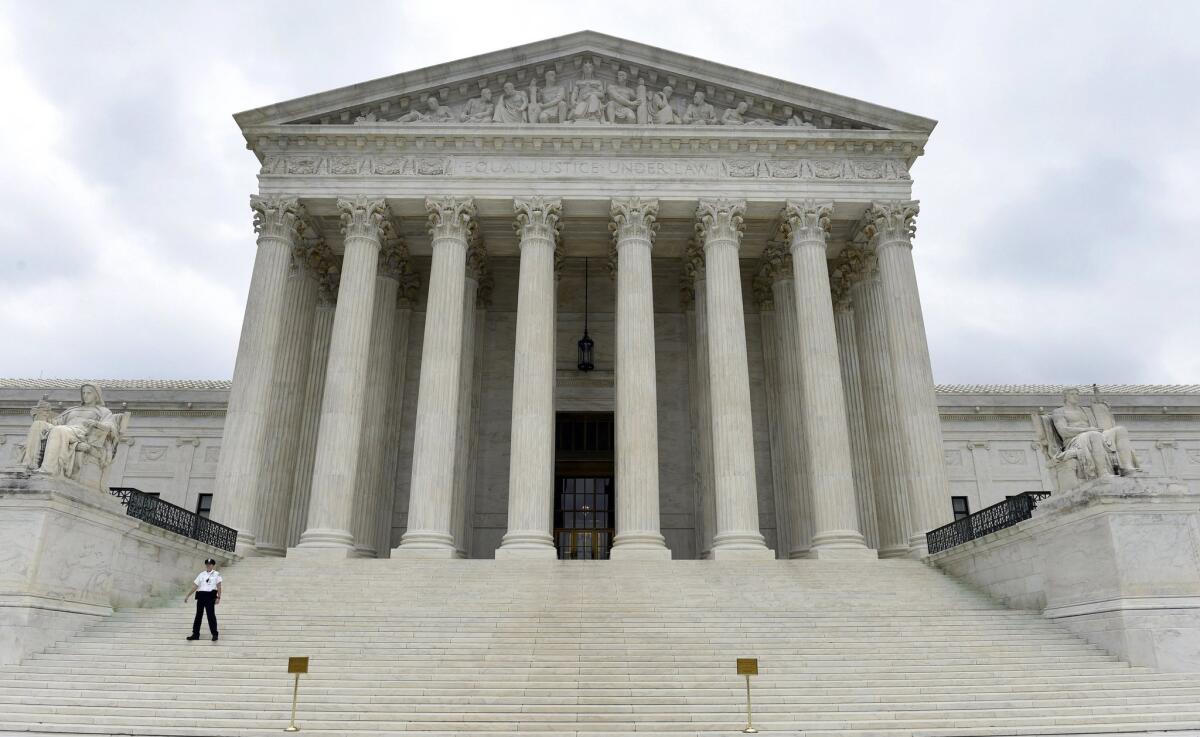The Supreme Court should drop a problematic New York gun case

- Share via
The U.S. Supreme Court will hear oral arguments Monday in a New York City gun case that the justices could toss out because there no longer is an issue on the table for them to decide. Or they could lurch to the other extreme and hold that the 2nd Amendment confers a personal right to carry a firearm in public. For once, we hope the court takes the easy way out and drops the case rather than giving the 5-4 conservative majority a chance to dangerously expand the scope of the 2nd Amendment.
At issue is a New York City restriction that barred people who owned a handgun under a “premises license” from taking the gun from their home (or business) unless they carried it unloaded and unlocked to any of seven firing ranges within the city. That meant they could not carry a legally owned weapon out of the city for practice at ranges, to be used in shooting competitions, or to accompany the owner to a second home to be used for self-protection there.
The city argued that it had a broad interest in preserving public safety by ensuring firearms licensed for use in the home stayed there. While we sympathize with the goal of keeping firearms off the streets, the means that New York City concocted were ill-conceived and restrictive to the point of silliness. Regrettably, but predictably, that restriction drew a challenge by gun-rights advocates.
A federal district court judge and the 2nd Circuit Court of Appeals ruled for the city. The plaintiffs appealed to the Supreme Court in hopes of persuading the justices to expand the court’s 2008 decision in District of Columbia vs. Heller and recognize an individual right to carry a firearm for self-protection in public. The high court took the case in January; seeing the danger ahead, the city and state of New York subsequently changed the restrictions to let gun owners carry their weapons — still locked and unloaded — out of the city. The city then asked the Supreme Court to drop the case.
The court demurred, so Monday’s arguments will be about whether the court should even consider the case — technically, whether New York’s rescission of the restrictions made the issue moot — and if it should, whether the ban conflicts with the 2nd Amendment, the Commerce Clause and the right to travel.
The latter issues hang on arcane points. New York argues, for instance, that its restriction didn’t interfere with anyone’s right to travel. It just barred travelers from taking the gun licensed to their home or office with them. The city’s lawyers also assert that restricting the ability to transport guns met a legitimate government concern: maintaining public safety and reducing the presence of guns on streets.
The more significant issue is the 2nd Amendment. The court could — and often does — issue narrow rulings in cases before it. But the fear among gun control advocates is that the conservative majority will use this case to rule that the 2nd Amendment right to bear arms for self-protection need not be limited to one’s residence.
We disagree at a fundamental level with the Heller decision, which upended decades of jurisprudence that the 2nd Amendment conferred a right for Americans to keep arms collectively — in militias, for instance. In Heller’s 5-4 majority opinion written by Justice Antonin Scalia, the court ruled that “there seems to us no doubt, on the basis of both text and history, that the 2nd Amendment conferred an individual right to keep and bear arms.” And, the court ruled, the right to self-defense has a long history. But it also said that the government has a legitimate interest in reasonable regulations governing who can buy and carry guns, and restricting them from sensitive locations.
But where and how can that right to own a gun for self-defense be exercised? And does carrying a firearm in public add to one’s ability to fend off a bad guy? It seems not, judging by studies that find increased gun violence in states that have right-to-carry laws. A more heavily armed America, with people carrying firearms everywhere they go, is not a safer America. Unfortunately, the conservative majority on the court, with its reliance on its own perceptions of the Founders’ original intent, could subordinate public safety to whatever individual right it believes the 2nd Amendment confers. It would be much better for the court to decide that since the New York City restrictions have gone away, so, too, should this case.
More to Read
A cure for the common opinion
Get thought-provoking perspectives with our weekly newsletter.
You may occasionally receive promotional content from the Los Angeles Times.









